In Honor of Eugene Lang '38

Earlier today President Valerie Smith shared the following message with the Swarthmore College community:
Dear Friends,
Our community lost one of its most dedicated, inspiring, and generous members when Eugene M. "Gene" Lang ’38 H'81 — entrepreneur, philanthropist, and chair emeritus of the College’s Board of Managers — died peacefully at home this morning. Gene was a giant in the world of education, a champion of the liberal arts, and an acknowledged force in promoting civic and social responsibility among students, faculty members, and educational institutions. He turned 98 on March 16.
"Gene Lang’s gifts to Swarthmore College were transformative, but his legacy at the College is much more than financial," says current Board Chair Tom Spock '78. "While he was a philanthropist of the highest order, and his generosity has enabled the College to become what it is today, his impact transcended the many buildings, scholarships, and programs he funded. There was a unifying theme to Gene’s generosity; his relentless focus on social responsibility, and on the debt to society owed by all those lucky enough to have the privilege of a Swarthmore education, has helped us understand ourselves better, and to aspire to achieve – and give back – more than we otherwise might. Generations of students, faculty, and staff have been shaped by Gene’s intellect and passion, and that’s a gift without a price."
Learn more in The New York Times, The Washington Post, All Things Considered, NBC's Sunday Today, and the Philadelphia Inquirer.
Gene gave hundreds of millions of dollars to help thousands of students at Swarthmore and around the country realize their dreams, and by establishing the "I Have A Dream" Foundation, he inspired even more students to pursue a college degree.
At Swarthmore, his decades of support established, matched, or made possible ten community spaces on campus, including the Eugene and Theresa Lang Performing Arts Center (LPAC), the Lang Music Building, the Lang Center for Civic & Social Responsibility, and the fragrance garden named for Theresa, his beloved wife of 62 years who predeceased him in 2008. He also helped to sustain the College’s academic excellence by endowing dozens of faculty positions and fellowships and student scholarships.
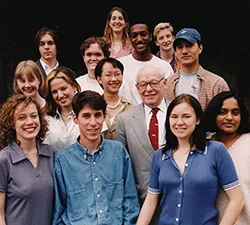
Current and past Lang Opportunity Scholars are a living testimony to Eugene Lang's vision of leadership in civic engagement.
Gene's Swarthmore legacy is perhaps best represented by the more than 200 current and past Lang Opportunity Scholars. These Scholars have completed projects, stewarded by the Lang Center, in more than 80 cities in 31 countries, from Chester, Pa., (expanding adult educational opportunities) and Newark, N.J. (helping girls ages 12 to 15 affected by homicide) to India (improving childbirth outcomes) and Zimbabwe (enhancing early childhood development). They have gone on to receive numerous honors, including Luce, Mitchell, and Rhodes Scholarships, Watson Fellowships, and recognition from the Clinton Global Initiative, Davis Projects for Peace, and the Society for Professional Journalists.
Gene believed in inspiring in young people a spirit of civic engagement and social responsibility. The Lang Center continues that work by connecting the College’s curriculum, campus, and community through engaged scholarship and collaborative action.
“I find it inspiring to be at Swarthmore and to be able to talk with students and to respond to their interests and ideas," Gene said in an extensive 2011 interview about his life. "The spirit of Swarthmore and the role of Swarthmore in our society is that of a progressive, creative, social force."
"Eugene Lang’s example serves as a testament to the Quaker adage of ‘letting your life speak’ and has inspired countless others to engage in meaningful philanthropy," says Vice President for Advancement Karl Clauss. "We are exceedingly proud of him as an alumnus and former board chair, and we are deeply grateful for and honored by Gene’s and his family’s generous support.”
Humble Beginnings
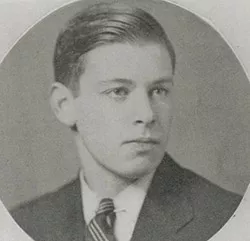
Eugene Lang '38 in The Halcyon is described: “During freshman year New Yorker Gene Lang's roommate charged him with having a touch of genius. Ever since Gene's worked hard to prove it. Economics major, he belligerently presents his leftist theories aided by charts, graphs, pliable of course. A Kwinker, he's constantly reforming; a debater, he is constantly arguing. Potential CIO mogul, challenging Lang has boxing pretensions, claims he understands the man on the street, is sincere. Said graph-obsessed Gene when one of his theories was questioned: ‘If you turn the chart upside down it will work.’"
Born to Hungarian immigrants in New York City in 1919, Gene came of age in the Great Depression. His father never finished grammar school, but Gene recalled that he taught him that “the only human being that merits the dignity of the adjective ‘human’ was one who was creative, someone who added something to the social condition of the community.”
Gene graduated from high school at 15 and enrolled in the City College of New York. But a fortuitous encounter with a Quaker businessman, George Jackson, Class of 1921 (a customer at the restaurant in which Gene washed dishes), piqued his interest in Swarthmore. The College offered him a full scholarship and, 50 years later, Gene paid it forward by sponsoring a Swarthmore scholarship in Jackson's honor.
While earning his B.A. in economics at Swarthmore, Gene ran successful dry-cleaning and college-pennant manufacturing businesses. He also led a weekly youth club at a settlement house in Philadelphia, an experience that proved formative.
"I would [go] on Monday evenings," he once described, "to meet with a group of 13 or 14 kids, almost my age, all African American. For each meeting, I had to think of an agenda that could keep them interested. For my finest hour, inspired by the lab experience of my freshman bio course, I decided to engage my kids at the guild with a cooperative but guided dissection of a dogfish — an agenda enthusiastically shared and destined to have a far greater impact than I ever could have imagined."
About five years later, Gene recalled, he received a letter from one of the young people informing him that the dogfish experience had made him re-evaluate his life and go back to school with the goal of becoming a doctor.
"Most significantly," Gene said, "he wrote the letter to me when notified of his admission as a pre-med scholarship student to a prominent university. I can never forget that."
Entrepreneurial Success
After the attack on Pearl Harbor, Gene tried to enlist for the war but was rejected, apparently because of flat feet. “I thought that was ridiculous,” he said, “but I decided I wasn’t going to be defeated.” Gene went to work for aircraft parts factory Heli-Coil on Long Island while earning an M.S. from Columbia University and taking mechanical engineering courses at the Brooklyn Polytechnical Institute.
Rising to part owner of Heli-Coil, Gene recognized a need for more subcontractors to get manufacturers the materials that the war effort demanded. In 1952, he founded Resources and Facilities Technology Development Corporation (REFAC) to develop high-tech products in world markets by creating overseas manufacturing licenses and joint ventures, including the first post-war manufacturing venture in Japan.
Gene consulted with the Departments of State and Commerce under the Eisenhower and Kennedy administrations and served on numerous trade missions around the world. He also once joked that REFAC had "the particular virtue of being pronounceable in every language without translating into a bad word in any."
A Defining Moment
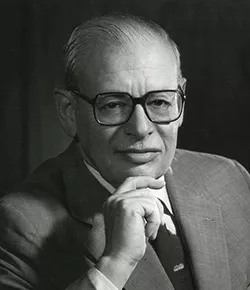
Eugene Lang '38 joined Swarthmore's Board of Managers in 1970, served as chair from 1982-88, and as chair emeritus since 1989.
In 1981, Gene returned to his elementary school alma mater, P.S. 121 in East Harlem, to address a class of graduating sixth graders. In an oft-told tale, on the way to the podium, the principal told Gene that three-quarters of the school's students would probably never finish high school. Gene then made an impromptu change to his speech, promising a college education to every sixth grader who stayed in high school and graduated.
Gene told the graduates about his experience of witnessing the Rev. Dr. Martin Luther King Jr.'s famous "I Have a Dream" speech at the 1963 March on Washington for Jobs and Freedom. He urged the students to dream their own dreams and promised to do all he could to help them achieve their goals.
Since Gene founded the program in 1986, and because of the power of sustained personal mentoring, more than 200 "I Have A Dream" programs have served more than 16,000 students – “dreamers,” as Gene affectionately called them — in 28 states, Washington, D.C., and New Zealand.
A Unique Legacy
Gene’s support of higher education also extends to the Eugene Lang College at New York's New School, a small, seminar-style undergraduate liberal arts college he founded in 1985, and Columbia University, which houses the Eugene M. Lang Center for Entrepreneurship that he established in 1996.
“I think a lot of what it took for me to accomplish all of this came from the challenges that Swarthmore presented me,” he said.
His first gift to Swarthmore came in the 1950s, in honor of his parents. Later, significant gifts brought the Lang Music Building and then LPAC to campus.
According to Maurice Eldridge '61, a retired vice president for college and community relations in whose name Gene dedicated the Eldridge Commons in the Science Center, “That was the foundation for bringing performing arts, music and dance, and the visual arts into their rightful place at the heart of liberal arts."
“I felt the arts were appreciated here but not necessarily part of the educational flow," Gene once said. “I wanted to do something about that.”
"Gene was an early adopter of the 'nudge' concept," says Board Chair emerita Barbara Mather '65, "although if the nudge didn't work he was prepared to back it up with a hard shove. He was relentlessly focused on what was morally right and right for the College. He led by persuasion and by example, encouraging others to reach into their hearts and pockets with him. He was one of a kind."
His more three dozen honorary degrees (including an honorary Doctorate of Laws from Swarthmore in 1981), attest to his profound faith in the power of community service and of education. In 1996, President Bill Clinton awarded him the Presidential Medal of Freedom, the country's highest civilian honor, and said at the time that "hardly anyone has ever done more personally to give people who who didn't have it, opportunity... We are all the beneficiaries of Eugene Lang’s innovative vision."
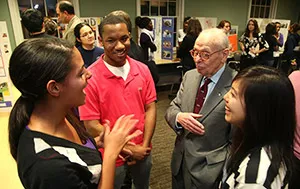
Eugene Lang made a point to meet with students at the Lang Center when he returned to campus for meetings of Swarthmore's Board of Managers.
In 2011, Gene's philanthropy and legacy to Swarthmore were celebrated on campus — fittingly, in the performing arts center that bears his and his wife's name. The celebration featured a symposium that addressed social responsibility in the 21st century and artists as agents of social change. Also present were Gene’s children, Jane Lang ’67 and Stephen Lang ’73 H’10, as well as Jane’s daughter, Jessica Lang ’92, and Stephen’s son, Noah Lang ’10. Lang is also survived by his sister, Barbara, son, David, six other grandchildren: Lucy Lang '03 and Joanna Lang '11, Ben, Dan, Grace, and Jacob, and eight great-grandchildren.
In 2012, the College announced a gift of $50 million, the largest in its history, from Gene to make possible the planned Biology, Engineering, and Psychology Building. A critical aspect of the College’s strategic plan, the project will help to extend connections between the College's engineering program and the other disciplines that comprise a liberal arts education — a goal that Gene long believed would play a crucial role in the expansion and application of knowledge.
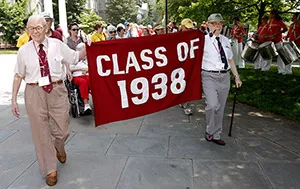
Eugene Lang '38 in the 2008 Alumni Weekend Parade of Classes. He marched with his class again in 2013.
"Higher education in the 21st century will serve its students — and society — best if it focuses on knowledge design, real-world problem solving, and basic research," he once said. "Because Swarthmore combines engineering with a strong liberal arts education, the College is uniquely situated to meet those contemporary needs. It is deeply rewarding to be able to steward Swarthmore's strong commitment to the creation of knowledge and the use of that knowledge to improve the lives of others."
Indeed, Lang once recalled how another great friend of the College, Thomas McCabe, Class of 1915, chose to "pass the baton" of caring for Swarthmore to him and that he "took that baton very seriously."
Another component of Gene’s legacy is Project Pericles, a national nonprofit he founded in 2001 that empowers colleges and universities to teach social responsibility and participatory citizenship. Swarthmore was a founding member of the project, which now includes nearly 30 institutions.
Gene’s legacy lives on in all who experienced and benefited from his mentorship and influence. Until a few years ago, he visited Lang Scholars at the Lang Center each semester and made himself available by phone. He also maintained close connections with Lang Scholar alumni and College faculty.
“We all need heroes," says Salem Shuchman ’84, a member of the Board of Managers who was among the first class of Lang Scholars. "Gene is mine.”
For Gene, though, the emphasis was always on how fortunate he was to be able to help others realize their dreams. Ever the practical engineer, he said: “I never just give money. I use it to put ideas to work.”
A funeral will be Wed., April 12, at 10 a.m. at Temple Emanu-El in New York City. A campus memorial service is also planned for a later date and we will share additional details as they become available.
Sincerely,
Valerie Smith
President




